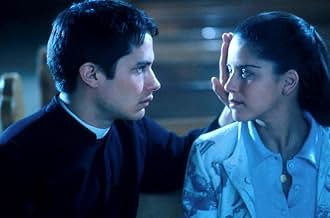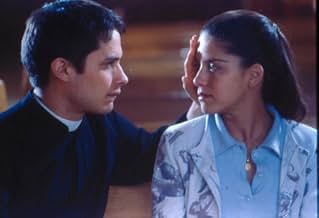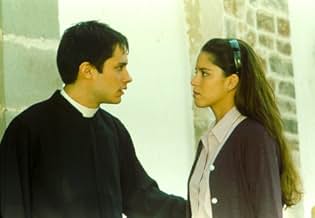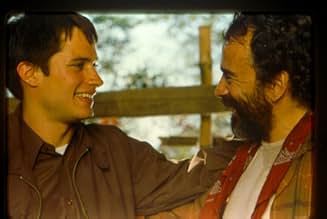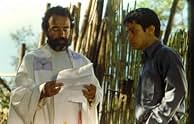AVALIAÇÃO DA IMDb
6,7/10
15 mil
SUA AVALIAÇÃO
A política e as paixões sexuais ameaçam corromper um jovem padre recém ordenado em uma pequena cidade mexicana.A política e as paixões sexuais ameaçam corromper um jovem padre recém ordenado em uma pequena cidade mexicana.A política e as paixões sexuais ameaçam corromper um jovem padre recém ordenado em uma pequena cidade mexicana.
- Direção
- Roteiristas
- Artistas
- Indicado a 1 Oscar
- 21 vitórias e 15 indicações no total
Pedro Armendáriz Jr.
- Presidente Municipal Gordo
- (as Pedro Armendáriz)
- Direção
- Roteiristas
- Elenco e equipe completos
- Produção, bilheteria e muito mais no IMDbPro
Avaliações em destaque
This "modern" adaptation from the classic novel written by Portuguese writer Eça de Queiroz in 1875 is very disappointing. The daring and exquisite novel was turned into a Mexican melodrama. Gael García Bernal ("Amores Perros", "Y Tu Mamá También", "La Mala Educación", "The Motorcycle Diaries") is a talented actor, but even his charisma couldn't conceal the flaws of the movie.
Eça de Queiroz is a very esteemed writer at Brazilian schools, and his importance for Portuguese Literature is incontestable; he deserved more respect. I just can't understand why this "El Crimen del Padre Amaro" was so praised by most critics. Anyway, it's sad to see that such a strong book was so poorly adapted. It isn't horrible, but could have been too much better. 4 out of 10.
"One of the most controversial films ever made"? NO WAY!
Eça de Queiroz is a very esteemed writer at Brazilian schools, and his importance for Portuguese Literature is incontestable; he deserved more respect. I just can't understand why this "El Crimen del Padre Amaro" was so praised by most critics. Anyway, it's sad to see that such a strong book was so poorly adapted. It isn't horrible, but could have been too much better. 4 out of 10.
"One of the most controversial films ever made"? NO WAY!
The release of the film THE CRIME OF PADRE AMARO caused about as much of an uproar in Mexico in 2002 as the publication of the novel, written by Jose Maria Eca de Queiroz, caused in 1875. With its dangerously intertwining themes of spiritual ecstasy and sexual passion, it's not hard to see why. At the heart of the story is a young priest who wrestles in a major way with the tempting hungers of his body and the grace-filled yearnings of his spirit. It does not help that, to pursue his vocation, he is sent to a town sustained by a culture of corruption.
One thing actor Gael Garcia Bernal does not know how to do is give a bad performance, and in the movie's title role he captures brilliantly all the agonizing ambiguity that comes with being a young adult male intent on asserting his masculinity while also serving the spiritual needs of his community. Unfortunately, his happily deluded demeanor meets with an equally intense personality in the form of Amelia, a devout young devotee acted with mesmerizing perfection by the gorgeous Ana Claudia Talancon. Amelia idolizes the young priest as a true and noble holy man whose sexuality is made sacred by his presumably pure soul. He in turn dares to drape her in a cape reserved for representations of the Madonna and recites to her from Solomon's "Song of Songs" as they seduce each other. Controversial? Better believe it.
As in the film THE HEALER (please see companion review) "The Crime of Padre Amaro" depicts sexuality and spirituality as equally powerful forces of attraction capable of producing very different results, which will not be revealed here. The outcome in "The Crime of Padre Amaro" is shocking in more ways than one and well worth contemplating for a long time.
by Author-Poet Aberjhani, author of "Christmas When Music Almost Killed the World"
One thing actor Gael Garcia Bernal does not know how to do is give a bad performance, and in the movie's title role he captures brilliantly all the agonizing ambiguity that comes with being a young adult male intent on asserting his masculinity while also serving the spiritual needs of his community. Unfortunately, his happily deluded demeanor meets with an equally intense personality in the form of Amelia, a devout young devotee acted with mesmerizing perfection by the gorgeous Ana Claudia Talancon. Amelia idolizes the young priest as a true and noble holy man whose sexuality is made sacred by his presumably pure soul. He in turn dares to drape her in a cape reserved for representations of the Madonna and recites to her from Solomon's "Song of Songs" as they seduce each other. Controversial? Better believe it.
As in the film THE HEALER (please see companion review) "The Crime of Padre Amaro" depicts sexuality and spirituality as equally powerful forces of attraction capable of producing very different results, which will not be revealed here. The outcome in "The Crime of Padre Amaro" is shocking in more ways than one and well worth contemplating for a long time.
by Author-Poet Aberjhani, author of "Christmas When Music Almost Killed the World"
How quickly the events in the news can inure us to the ugly realities of life. In the wake of all those priest sex scandals that have come to light in recent times, `El Crimen Del Padre Amaro' comes across as more timely, yet less shocking, to us today than it would have had it been released a few years back. This Oscar-nominated film from Mexico, written by Vincent Lenero and directed by Carlos Carrera, features priests who fornicate, priests who launder drug money, priests who arm guerrillas, priests who pay for abortions, priests, in short, who seem to do everything imaginable except what they were originally ordained to do. Not only is the Church hierarchy in this film in bed with drug runners (as well as half the female members of the parish, apparently), but it even dictates to the local newspaper what it will report about the Church and where on the front page such stories will go.
It's safe to say that many devout Catholics will see this film as yet another anti-papist screed designed to further degrade the image of the world's most powerful religious organization. But the makers of `El Crimen Del Padre Amaro' seem less concerned with attacking the Church than with examining the human frailties that motivate the characters' actions. Part of their argument seems to be that the complexities of life and of human nature make it virtually impossible for anyone of flesh and blood to remain saintly for very long. This is particularly true in a setting like rural Mexico where the day-to-day struggle for survival overwhelms all other concerns - spiritual as well as temporal. Father Benito is the leader of the parish who rationalizes his dealings with the local drug dealers by arguing that `bad money becomes good money' when it is used in the service of the Lord. How else is he going to get the funds necessary to build the new hospital for his people? Father Natalio, an espouser of `liberation theology,' finds himself at loggerheads with Father Benito, actually arming the very guerillas who fight against those same drug lords. Natalio suffers no qualms about having men killed if that is what is necessary to achieve his goals for his people. Finally, Father Amaro, the focal point of the film, has his own demons to confront. Barely out of seminary, this idealistic young man (played by Gael Garcia Bernal, one of the leads of `Y Tu Mama Tambien') arrives in town determined to make his mark as a priest who does good for his parishioners. What he doesn't bank on is the corrosive effect of the corrupt system into which he is sent or his own susceptibility to the weaknesses of the flesh. Being young and handsome, Father Amaro soon finds himself the target of an amorous young woman who confuses pious sentiment with plain and simple erotic desire.
What makes Father Amaro interesting is that he is never as righteous as we think he should be in the beginning and never as unredeemably corrupt as we think he should be at the end. In many ways, he is just like anyone else who looks for the easiest way out for himself when the going gets tough. Many viewers may want Amaro to assume the role of conventional hero, stepping in to right the wrongs taking place in this village. Yet, he will not accept that role. What makes the story tragic is not that Amaro is a man of potential greatness brought down by his own weaknesses or the machinations of others, but the fact that he is basically just an ordinary kid trying hard to be `extraordinary' (choosing the priesthood as his way of achieving it), yet lacking the intestinal fortitude and strength of character men must have if they hope to be great. That Amaro slips so easily into the amoral role set up for him by the likes of Father Benito (even though the old priest seems to find some redemption at the end) is what gives the film its air of frustrating hopelessness. Who, we are led to ask, will finally put an end to this vicious cycle? We know it will not be Amaro.
In many ways, the filmmakers may be trying to do too much in this film. Each of the stories involving the three priests could make an interesting movie in its own right. As it is, we sometimes get the sense that the film, in trying to create a full-blown tapestry of Catholicism in Mexico, ends up giving short shrift to some of the more fascinating elements of the story. So much time is spent on the sexual dalliances of Father Amaro and the girl, Amelia, that we don't really get to see enough of the other forms of controversy and corruption with which the film is dealing. The Liberation Theology movement, in particular, is dealt with in rather too sketchy a fashion, leaving us generally puzzled and unenlightened on that topic.
The actors do a superb job bringing their characters to life. In addition to the aforementioned Bernal, Sancho Gracia and Damian Alcazar are excellent as Amaro's fellow troubled priests and Ana Claudia Talancon is pretty and poised as the young girl drawn by lust, love and passion to this weak-souled priest.
Viewers will most likely find `El Crimen Del Padre Amaro' to be either a brave film or an offensive one, depending on which side of the religious divide they happen to come down on. But after the recent stories in the news, very few of us should really be shocked by what we see here on the screen.
It's safe to say that many devout Catholics will see this film as yet another anti-papist screed designed to further degrade the image of the world's most powerful religious organization. But the makers of `El Crimen Del Padre Amaro' seem less concerned with attacking the Church than with examining the human frailties that motivate the characters' actions. Part of their argument seems to be that the complexities of life and of human nature make it virtually impossible for anyone of flesh and blood to remain saintly for very long. This is particularly true in a setting like rural Mexico where the day-to-day struggle for survival overwhelms all other concerns - spiritual as well as temporal. Father Benito is the leader of the parish who rationalizes his dealings with the local drug dealers by arguing that `bad money becomes good money' when it is used in the service of the Lord. How else is he going to get the funds necessary to build the new hospital for his people? Father Natalio, an espouser of `liberation theology,' finds himself at loggerheads with Father Benito, actually arming the very guerillas who fight against those same drug lords. Natalio suffers no qualms about having men killed if that is what is necessary to achieve his goals for his people. Finally, Father Amaro, the focal point of the film, has his own demons to confront. Barely out of seminary, this idealistic young man (played by Gael Garcia Bernal, one of the leads of `Y Tu Mama Tambien') arrives in town determined to make his mark as a priest who does good for his parishioners. What he doesn't bank on is the corrosive effect of the corrupt system into which he is sent or his own susceptibility to the weaknesses of the flesh. Being young and handsome, Father Amaro soon finds himself the target of an amorous young woman who confuses pious sentiment with plain and simple erotic desire.
What makes Father Amaro interesting is that he is never as righteous as we think he should be in the beginning and never as unredeemably corrupt as we think he should be at the end. In many ways, he is just like anyone else who looks for the easiest way out for himself when the going gets tough. Many viewers may want Amaro to assume the role of conventional hero, stepping in to right the wrongs taking place in this village. Yet, he will not accept that role. What makes the story tragic is not that Amaro is a man of potential greatness brought down by his own weaknesses or the machinations of others, but the fact that he is basically just an ordinary kid trying hard to be `extraordinary' (choosing the priesthood as his way of achieving it), yet lacking the intestinal fortitude and strength of character men must have if they hope to be great. That Amaro slips so easily into the amoral role set up for him by the likes of Father Benito (even though the old priest seems to find some redemption at the end) is what gives the film its air of frustrating hopelessness. Who, we are led to ask, will finally put an end to this vicious cycle? We know it will not be Amaro.
In many ways, the filmmakers may be trying to do too much in this film. Each of the stories involving the three priests could make an interesting movie in its own right. As it is, we sometimes get the sense that the film, in trying to create a full-blown tapestry of Catholicism in Mexico, ends up giving short shrift to some of the more fascinating elements of the story. So much time is spent on the sexual dalliances of Father Amaro and the girl, Amelia, that we don't really get to see enough of the other forms of controversy and corruption with which the film is dealing. The Liberation Theology movement, in particular, is dealt with in rather too sketchy a fashion, leaving us generally puzzled and unenlightened on that topic.
The actors do a superb job bringing their characters to life. In addition to the aforementioned Bernal, Sancho Gracia and Damian Alcazar are excellent as Amaro's fellow troubled priests and Ana Claudia Talancon is pretty and poised as the young girl drawn by lust, love and passion to this weak-souled priest.
Viewers will most likely find `El Crimen Del Padre Amaro' to be either a brave film or an offensive one, depending on which side of the religious divide they happen to come down on. But after the recent stories in the news, very few of us should really be shocked by what we see here on the screen.
Based on an 1875 Portuguese novel by Eca de Quieros, The Crime of Father Amaro, the new film from director Carlos Carrera, has been updated to modern Mexico. As it opens, Father Amaro (Gael García Bernal) comes to Las Reyes for his first assignment. He starts out as an idealist, showing kindness to a fellow bus passenger whose money is stolen during a holdup, but when he arrives at the parish, he quickly caves in to the established order.
Father Benito (Sancho Gracia) is his superior, and his main project is the building of a hospital, orphanage, and rest home. It is soon learned that Benito is having an affair with a local café proprietor Sanjuanera (Angélica Aragón) and has taken money from the area's major drug lord to finance the hospital. Benito is also a vocal opponent of the "good" priest, Father Natalio (Damían Alcázar) whose support of the peasants and their guerilla revolution stirs resentment from the church hierarchy.
When a reporter for the local paper is given photographs of Father Benito at a baptism with the drug kingpin, he writes an article alleging that the hospital is a front for laundering drug money. The bishop urges Father Amaro to write a rebuttal (i.e., a cover-up) in the paper saying that the funds came only from the church. Amaro then has an affair with the reporter's ex-girlfriend, Sanjuanera's young daughter Amelia (Ana Claudia Talancón), and in an awkward scene, the priest drapes her in a blue robe that has been designed for the local church's statue of the Virgin Mary. "You're more beautiful than the blessed virgin," he tells her. The result of this liaison is a scandal that rocks the church.
The Catholic Church has called for a boycott of The Crime of Father Amaro on religious grounds. Personally, I'm more concerned with its artistic transgressions. The film provides little insight into the conflicting pressures that priests face in today's world, and the characters are shallow and uninteresting. Given recent headlines about sexual abuse, this issue could have been the focus for an important film, but Carrera hits us over the head with his message so often that the film ends up as manipulative melodrama, light years away from the subtle ironic thrusts of a Buñuelian sword.
Father Benito (Sancho Gracia) is his superior, and his main project is the building of a hospital, orphanage, and rest home. It is soon learned that Benito is having an affair with a local café proprietor Sanjuanera (Angélica Aragón) and has taken money from the area's major drug lord to finance the hospital. Benito is also a vocal opponent of the "good" priest, Father Natalio (Damían Alcázar) whose support of the peasants and their guerilla revolution stirs resentment from the church hierarchy.
When a reporter for the local paper is given photographs of Father Benito at a baptism with the drug kingpin, he writes an article alleging that the hospital is a front for laundering drug money. The bishop urges Father Amaro to write a rebuttal (i.e., a cover-up) in the paper saying that the funds came only from the church. Amaro then has an affair with the reporter's ex-girlfriend, Sanjuanera's young daughter Amelia (Ana Claudia Talancón), and in an awkward scene, the priest drapes her in a blue robe that has been designed for the local church's statue of the Virgin Mary. "You're more beautiful than the blessed virgin," he tells her. The result of this liaison is a scandal that rocks the church.
The Catholic Church has called for a boycott of The Crime of Father Amaro on religious grounds. Personally, I'm more concerned with its artistic transgressions. The film provides little insight into the conflicting pressures that priests face in today's world, and the characters are shallow and uninteresting. Given recent headlines about sexual abuse, this issue could have been the focus for an important film, but Carrera hits us over the head with his message so often that the film ends up as manipulative melodrama, light years away from the subtle ironic thrusts of a Buñuelian sword.
In my opinion, the best thing about El Crimen del Padre Amaro is Vicente Leñero's script - updating a story from 1875 without losing the magic scenes created by Eça de Queiroz so long ago. Gael Garcia Bernal keeps proving that his talent is solid and we can expect much more from him in the future. Another good surprise is Ana Claudia Talancón, not only for her astonishing beauty, but also for a great performance as Amelia. The cast is very good and the plot, yet polemical, gives a lot to think. Again, by updating the old Portuguese story to a contemporary Mexico and inserting current issues like the relation between church and drug dealers, El Crimen del Padre Amaro raises some relevant questions about celibate, religious ethics and hypocrisy. As written in 1875, "loneliness is the greatest sin".
Você sabia?
- CuriosidadesThis movie began creating controversy even before it was released. Several groups, most of them related to the church, tried to ban it. They did not succeed; instead, tickets were sold out on opening weekend.
- Erros de gravaçãoAmaro gets beaten up by Ruben and receives some bruises in his face. A little later, when he meets Amelia in the church, the bruises are gone.
- Citações
Father Amaro: Tell me your sins, child.
Amelia: You already know them. And your sins?
- Cenas durante ou pós-créditos"In memoriam Paco Rabal"
- ConexõesFeatured in The 60th Annual Golden Globe Awards (2003)
Principais escolhas
Faça login para avaliar e ver a lista de recomendações personalizadas
- How long is The Crime of Padre Amaro?Fornecido pela Alexa
Detalhes
- Data de lançamento
- Países de origem
- Centrais de atendimento oficiais
- Idioma
- Também conhecido como
- The Crime of Padre Amaro
- Locações de filme
- Empresas de produção
- Consulte mais créditos da empresa na IMDbPro
Bilheteria
- Orçamento
- US$ 1.800.000 (estimativa)
- Faturamento bruto nos EUA e Canadá
- US$ 5.717.044
- Fim de semana de estreia nos EUA e Canadá
- US$ 504.681
- 17 de nov. de 2002
- Faturamento bruto mundial
- US$ 26.996.738
- Tempo de duração1 hora 58 minutos
- Cor
- Mixagem de som
- Proporção
- 1.85 : 1
Contribua para esta página
Sugerir uma alteração ou adicionar conteúdo ausente








